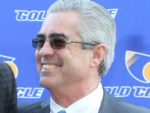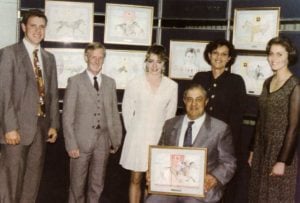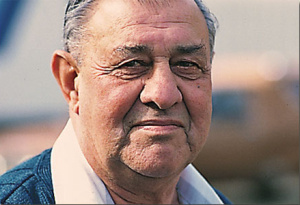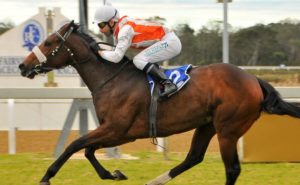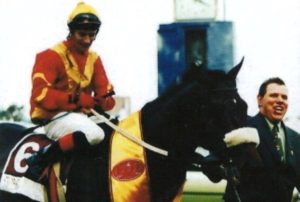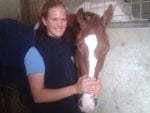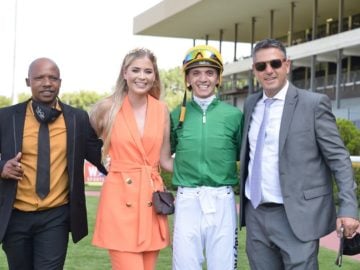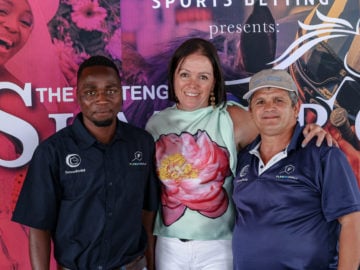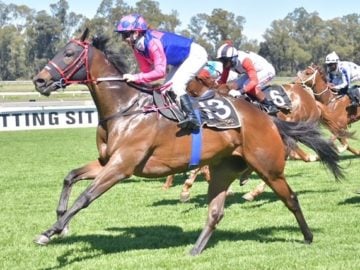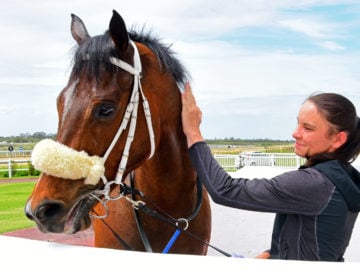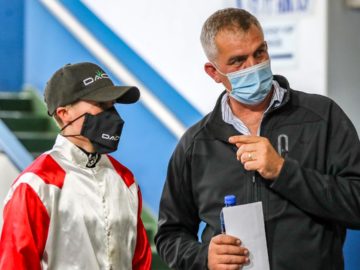There is an expression that wet saddle blankets make good horses – in other words, the more work you put into them, the better they get. Someone who also believes in the value of hard work – and is reaping the benefits – is current EC Champion trainer, Alan Greeff.
Alan Christopher Greeff was born on 4 April 1971. Born and bred in PE, he is a family man who is happiest putting in a hard day’s work at his Halo Stables yard and then going home to his family. Alan is married to Glenifer, who is also the yard’s secretary. Asked how long they’ve been married, he deadpans, “A long time.” Although Alan is one of 8 children, he and Glenifer have settled for three of their own – two daughters (both of whom are going into the teaching trade) and a son, who is currently studying to be a game ranger.
In the blood
Alan got his colours for polocrosse as a youngster and during his national service he played polocrosse in the army and trained as a farrier at Berede. However, being the son of training supremo Stanley Greeff, Alan says he never considered anything other than spending his life training horses.
“My dad and Mr Millard were great friends from childhood and I went to work for Mr Millard in his last season. When he retired I worked for Tony at the Vaal. From there I went to America and spent some time with Anton Barnard, who looked after Horse Chestnut when Mike de Kock first went to America. I spent a bit of time at Gainesway Stud as a groom / dogsbody, I worked at sales and did all that sort of thing. Only after I came back was I allowed to work for my dad.” he says proudly. “I grew up at the stables. It’s always been my life. I never wanted to be anything else but a trainer except maybe a vet, so that I had that behind me for when I became I trainer. But it was too much work to go to Varsity first.”
Stanley retired from racing on a high, with a final EC trainers’ championship under his belt. The exact number he won remains the subject of speculation. It is certainly more than 20. Some reports estimate the number may be as high as 25 or even 30, but for now it remains buried in the folklore of local racing which one suspects is how Stanley would have liked it. Alan took over the reins in 1995 and has continued where his father left off. Our research suggests this may be his 10th career EC Trainers’ Championship, but Alan says, “They’re telling me it’s 10, but I’m not really sure. I just come to train winners, so what happens, happens. You don’t train to win a championship – you train to train winners and for that, you have to put the horses first. If you’re aiming for championships, then you’ve got a different agenda, and you’ve probably taken your eye off the ball.”
Early influence
“Tony Millard, Mr Millard and my dad were all a big influence. Tony and I still have a good friendship and I learnt a lot from him. Other than that, my motto is hard work doesn’t kill you. I just strive to do the best all the time. I’m a workaholic as far as that goes. And lastly, of course, good clients.”
Client base
“I’ve got a nice client base that buys me horses. We go to all the sales and try and buy the best we can for our budget. I’ve also trained fillies for a lot of breeders. “My dad was good with fillies (perhaps most famously so with Soho Secret), so I was brought up that way. You’ll see a lot of my feature wins were won by fillies. At least, that’s my perception – I might be wrong. But because I train for a lot of breeders, I believe in trying to get a filly to get black type and try and add some value to them. It’s also nice to see fillies that go to stud breeding decent horses further down the line as well.”
Alan also has one special client in particular. Although his father passed away in 2010, Alan confirms, “Mom is still around. She comes racing and so on and has got a couple of horses that still run in her name.”
The yard
Halo Stables is named after the filly Halo, who was Stanley’s 100th winner of the season in 1980. He’d earlier broken Millard’s South African record of 90 winners in a season and went on to set a new mark of 105 – a phenomenal achievement considering PE only used to race once a week. Stanley kept a consistently high number of winners per season, a tradition that Alan has continued, and he finished with a total of 118 winners last season, placing him 3rd on the national log by wins, behind Sean Tarry and Justin Snaith. But the life of a trainer is a busy one, with little time for celebration before it’s on to the next day, the next race and the next season and Alan confirms, “What happened yesterday is done and dusted and you’ve got to look to the future. We ended the season on a Friday, Monday was the 1st of August and then we started all over again.”
The team
“My wife and I the only two people in the office. Amos, Thomas and Jackson are my assistants and stable employees that help run the yard. I am fluent in Xhosa as well. I think it helps the rest of the staff that they have contemporaries helping run things, rather than a big boss giving orders and my staff are a happy bunch generally.”
“Charles Ndlovo and Teaque Gould do most of the donkey work at track in the mornings. Obviously Greg or whoever is the stable jockey gets their pick of the rides, but Charles and Teaque are there day in and day out and do a lot of the hard work in between, so they get their fair share of rides and also ride their fair share of winners.”
Jockeys
Gavin Venter famously rode for Stanley for over 3 decades and similarly, Alan has built long-standing relationships with jockeys over the years with his association with Greg Cheyne being particularly successful. Alan concurs, “I was brought up by old fashioned trainers, with good old fashioned values. And I’ve got enough klaps in my day to put me straight. You can ask Greg Cheyne, Andrew Fortune, anyone who’s ridden for me – I’m pretty easy to ride for as long as things go well. They’ll tell you I’m the type of guy that expects the best. They’ve got to do their job and I do my part and everyone’s happy.”
Horses
“The yard size fluctuates from 100 – 120 depending on the time of the season. At the moment it’s emptying out quite fast as the older horses retire or go off to stud and the juveniles are coming in in drips and drabs.”
“We’ve got a nice base of horses that just turned three. O Tamara is one of them and did well last season. I think she’ll develop into a nicer horse this season, but the landscape’s forever changing. When the babies are coming in, it’s always exciting to see what you’ve bought and try and develop them into champions. You don’t know what you’ve got till you try them, so it’s always an exciting time of the year.”
“My staff do the breaking and training. I like it that way because you get to know each horse and learn their quirks from the word go. I do obviously get one or two via spelling farms, but if a horse is broken in on a spelling farm, you don’t know where the quirks are and you’ve still got to find them. When you do it yourself, you get to know the horse and its quirks and how to work around it. Every horse is an individual.”
Career Highlights
“I trained 7 winners and a second on an eight race card many years ago” (our records reflect that it was on 15 November 1996). “It was very unexpected, and I then promptly had none the following week. I think my dad might have had 7 winners on a card, too. My Gr1 winners – Cereus, Tatler (although the Golden Slipper was a Gr2 in those days) and Silver Arc were highlights. I won with Cereus and Tatler on the same day, raiding from PE and Tatler went on to be Equus Champion 3yo Filly. But there are lots of highlights along the line – good horses, bad horses, horses that should have been better than they were and things went wrong,” he reflects.
Competition
Racing is a competitive environment and with the advent of satellite yards and raiding strings, things are tougher than ever. Alan comments, “Competition is not a bad thing. PE trainers are a very hard working bunch of guys and girls. The big guys need the small guys and the small guys need the big guys. We’re all here for the same thing. We’ve all got to make a living and we’ve got to be happy with one another as such – although I know it does get tough at times. I’ve won my fair share as far as feature races go – you have to move with the times and it keeps you on your toes. I love PE. Very early in my career I had an opportunity to go to Singapore and turned it down. PE is a lovely place to live and to train and if we’ve got a good enough horse, we’ll take it somewhere.”
Trade secrets?
“I don’t think there are any secrets, just hard work and dedication – it’s the only thing I know. Not many people can say they do what they love. Lots of people sit in an office, doing things that are not really their passion. Racing is what I’ve always wanted and it’s what I’m doing, so like I said to my son – if you’re enjoying something, it isn’t really work.”
‹ Previous
